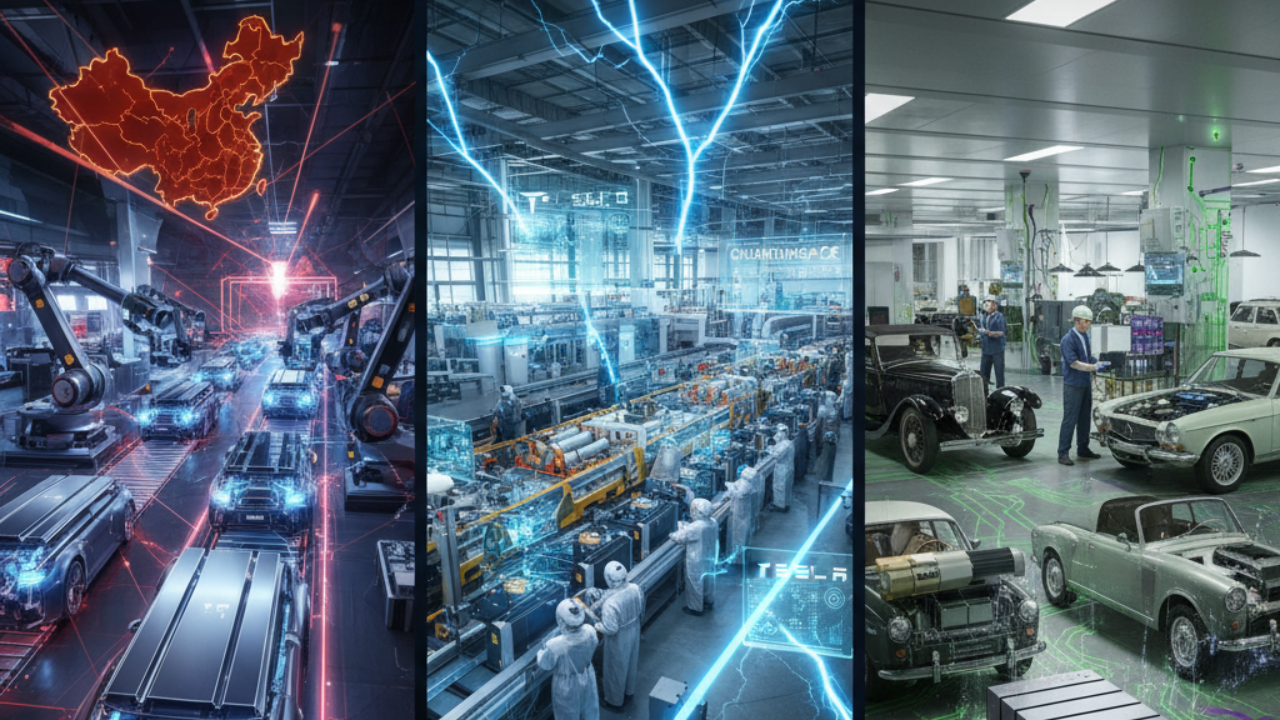
Post by : Meena Rani
The electric vehicle (EV) revolution is accelerating, with battery technology at the heart of this transformation. By 2025, China, the USA, and Europe are leading the global race to dominate electric car battery production, innovation, and market share. This article explores the current trends, strengths, challenges, and future prospects of these regions in shaping the EV battery industry.
China has emerged as the undisputed leader in electric car batteries. With massive investments in lithium-ion battery production and raw material supply, Chinese companies like CATL and BYD dominate global markets.
China’s success is fueled by government policies supporting EV adoption, subsidies for manufacturers, and aggressive expansion of battery production capacity. The country also controls significant portions of the global supply chain for lithium, cobalt, and nickel, giving it a competitive advantage in cost and production scale.
Chinese battery technology is advancing rapidly, with innovations in solid-state batteries, energy density improvements, and fast-charging capabilities. By 2025, China not only produces a majority of EV batteries globally but also exports cutting-edge technology to Europe and North America.
The United States is rapidly expanding its electric car battery industry, combining innovation, research, and manufacturing capacity. Companies like Tesla, Panasonic, and QuantumScape are pioneering breakthroughs in battery chemistry, solid-state batteries, and energy density.
The USA is investing heavily in domestic battery manufacturing through federal incentives, the Inflation Reduction Act, and public-private partnerships. These efforts aim to reduce reliance on imports and secure the supply chain for domestic EV production.
American companies are also focusing on sustainability, developing batteries with lower environmental impact, improved recyclability, and reduced reliance on rare earth materials. While production volumes are currently smaller than China’s, technological innovation positions the USA as a key player in the global battery market.
Europe has rapidly entered the EV battery race, emphasizing sustainable production and technological innovation. Companies like Northvolt, BASF, and Saft are expanding capacity to meet growing demand for EVs across the continent.
European policies prioritize environmental sustainability, ethical sourcing of materials, and energy-efficient manufacturing processes. The EU is also investing in gigafactories and research programs to ensure a local supply chain and reduce dependency on imports.
European battery technology focuses on long-range performance, safety, and recyclability. By 2025, Europe is positioned as a leader in sustainable battery production, catering to the continent’s ambitious EV adoption goals.
Several factors determine the global leadership in electric car batteries:
Raw Material Access: Lithium, cobalt, and nickel are essential for battery production. China dominates supply chains, while the USA and Europe are investing in local and sustainable sources.
Technology Innovation: Energy density, charging speed, battery life, and safety are critical for competitive advantage.
Manufacturing Scale: Gigafactories and mass production determine cost efficiency and supply reliability.
Government Policies: Subsidies, incentives, and strategic investments influence industry growth.
Sustainability: Recycling, eco-friendly production, and carbon footprint reduction are increasingly important.
Despite rapid growth, the EV battery market faces several challenges:
Raw Material Scarcity: Rising demand for lithium, cobalt, and nickel could create supply bottlenecks.
Environmental Concerns: Mining and production processes must minimize environmental impact.
Technological Barriers: Solid-state batteries and advanced chemistries are still under development.
Global Competition: Geopolitical tensions and trade restrictions may affect supply chains.
Recycling and Disposal: Efficient recycling infrastructure is critical to sustainable growth.
China currently leads in production volume, supply chain control, and global influence. The USA is a strong contender with technological innovation and strategic investments, particularly in solid-state batteries. Europe focuses on sustainability, ethics, and high-performance technology, carving a niche in premium EV markets.
By 2030, leadership may depend not only on production scale but also on innovation, sustainability, and supply chain security. Countries that combine these factors effectively are likely to dominate the global EV battery market.
The next decade will bring breakthroughs in solid-state batteries, faster charging, higher energy density, and longer lifespan. Recycling and reuse of battery materials will become mainstream, reducing environmental impact and supply constraints.
Autonomous EVs, smart grids, and renewable energy integration will further increase battery demand, requiring global collaboration, innovation, and sustainable production practices.
Disclaimer: The information in this article is based on available data as of 2025. EV battery technology, production capacity, and market trends are subject to change. Readers should consult official sources for the latest updates.
Electric Vehicles, EV Batteries, China EV Market, USA EV Industry, Europe EV Growth, Lithium-Ion, Battery Technology, 2025 EV Trends










Advances in Aerospace Technology and Commercial Aviation Recovery
Insights into breakthrough aerospace technologies and commercial aviation’s recovery amid 2025 chall

Defense Modernization and Strategic Spending Trends
Explore key trends in global defense modernization and strategic military spending shaping 2025 secu

Tens of Thousands Protest in Serbia on Anniversary of Deadly Roof Collapse
Tens of thousands in Novi Sad mark a year since a deadly station roof collapse that killed 16, prote

Canada PM Carney Apologizes to Trump Over Controversial Reagan Anti-Tariff Ad
Canadian PM Mark Carney apologized to President Trump over an Ontario anti-tariff ad quoting Reagan,

The ad that stirred a hornets nest, and made Canadian PM Carney say sorry to Trump
Canadian PM Mark Carney apologizes to US President Trump after a tariff-related ad causes diplomatic

Bengaluru-Mumbai Superfast Train Approved After 30-Year Wait
Railways approves new superfast train connecting Bengaluru and Mumbai, ending a 30-year demand, easi